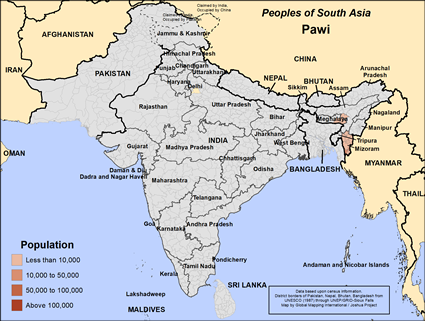Pawi in India

Send Joshua Project a photo
of this people group. |

Map Source:
People Group data: Omid. Map geography: UNESCO / GMI. Map Design: Joshua Project
|
| People Name: | Pawi |
| Country: | India |
| 10/40 Window: | Yes |
| Population: | 53,000 |
| World Population: | 53,000 |
| Primary Language: | Chin, Hakha |
| Primary Religion: | Christianity |
| Christian Adherents: | 98.62 % |
| Evangelicals: | 0.00 % |
| Scripture: | Complete Bible |
| Ministry Resources: | Yes |
| Jesus Film: | No |
| Audio Recordings: | Yes |
| People Cluster: | South Asia Tribal - other |
| Affinity Bloc: | South Asian Peoples |
| Progress Level: |
|
Introduction / History
Pawis are also known as the Lai. They primarily live in the Lawngtlai district of Mizoram, India. They are part of the broader Kuki-Chin-Mizo ethnolinguistic family and share cultural ties with groups in Myanmar and Bangladesh. None of them live in those nearby countries, however.
At one time they were slash-and-burn farmers.
What Are Their Lives Like?
Most are now settled farmers who grow rice. Some are government employees or small-scale traders, especially in towns under the Lai Autonomous District Council. Part of their economic activities involves making and selling woven and bamboo goods.
They have a clan-based social structure. Clans play a central role in marriage, inheritance, and dispute resolution. Their festivals are tied to the agricultural cycles and Christian holidays. Everyone comes together for church activities, festivals, and celebrations.
What Are Their Beliefs?
Almost all Pawis are Protestant. Churches serve as places for social gatherings as well as spiritual nourishment.
What Are Their Needs?
Due to a lack of good roads, Pawi communities are not easily reached. They can't get to medical facilities for emergencies, and schools are poor.
Prayer Points
Pray for good schools and medical clinics in each Pawi settlement.
Pray for the Holy Spirit to bless Pawi families and churches with revival fire.
Pray that soon Pawis will take Christ to Tibetan Buddhists and Hindus.
Pray for the Lord to bless them with an abundant harvest this year.